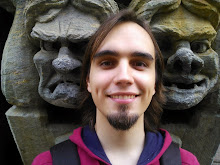As I was writing a blog that explores my views on Self-system, itself a pretty elusory task, I realized that there was certain literature I wanted to read so as to deepen the vision I have prior to formulating the first written statement. So I have spent the entire month on reading some of the books, the result of which I will attempt to present in a future post. This theoretical research was the main reason for the large time gap between posts here.
Yesterday, my friend and I spent about an hour at the local History of Religion Museum, which is located very close to my house, just in 5 minutes of walk. Strangely enough, I have never been to that museum before. Although, in some sense, this is pretty explainable, given the case I live in the City of Museums, with literally hundreds of museums being unvisited by me. I wanted to see one Buddhist exhibition on Amitabha's Pure Lands, which is considered as an ontological variation of Paradise in Buddhism, whereas, as far as I understand, according to a post-metaphysical perspective the Pure Lands in question are in fact quite specific domain of altered consciousness tapped into by the means of meditative practice; it seems to be a foundational plane of realized, becalmed consciousness which can be reached during dying.
However I may be mistaken in my interpretation and its details; and it was only the superficial experiential impression I've got during a meeting with one Tibetan Lama who introduced some preliminary Vajrayana practices at a seminar I accidentally attended (it was organized as a preparatory class for initiation into Phowa practice, which I didn't go to anyway). Incidentally, talking to this Lama and witnessing his work was very pleasing. Very, very modest man, indeed. It was intriguing to notice that all the (archaic) rituals are needed mostly as an exterior appearance, a sleight of hand for entertaining the public's attention, while "all the true stuff" was done mostly by the contemplative and psychoenergetic activity of Lama's mind going into profound altered states.
Unfortunately, the Museum's Buddhist exhibition was closed that day, so we were limited to exhibitions on Shamanism, Ancient Egypt, Greece, Rome, Early Christianity, Eastern Orthodox Christianity, Western Christianity, and Islam (including a tiny little section on Sufism, a very interesting esoteric contemplative discipline within the Islamic movement). We didn't think the overall impression of the exhibitions was satisfying: the most fun stuff in the history of religion, such as gnosticism and isichasm, wasn't even mentioned. The tiny section on Sufism was boring. Neither did I find anything on Meister Eckhart, my transpersonal favorite, although there were a few exhibits on Serafim of Sarov. There was also an exhibition of Viktor Vasnetsov's unknown religious paintings, which I observed with mixed feelings (this famous painter tended to paint faces with weird, bizarre, mad, hysterical eyes which seem to be very far from spiritual grace and peace).
The brightest experience of the Museum, however, was the picture of Danse Macabre, the famous Dance of Death, the great equalizer in the face of Non-Existence. This very notion is so wonderful, so powerful, so multifaceted, and in a way so liberating that I was reading some of the poems beneath the pictures of people dancing with skeletons with a joyful smile on my face.
Emperor, your sword won’t help you outSceptre and crown are worthless here
I’ve taken you by the hand
For you must come to my dance
Death and dying can be fascinating. Carlos Castaneda wrote in his books that death is always the best ally in living. In the face of death everything that you think you are and everything that belongs to you transmutates and shakes off its appearance, beneath which there is nothing but a grinning scull which then itself slowly decays until there is only the whisper: "I am no thing." The silence prevails throughout.



